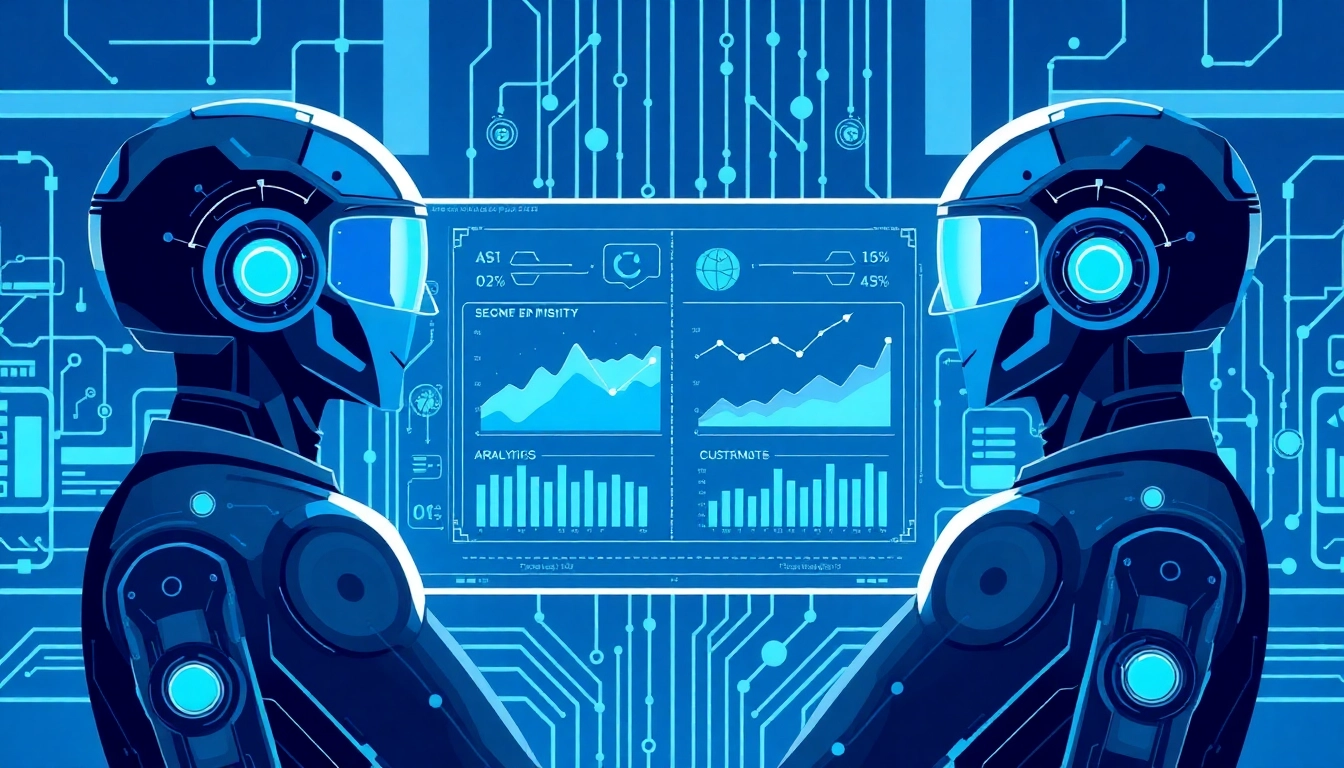Understanding AI Marketing Agents
In the rapidly evolving world of digital marketing, businesses continuously seek innovative strategies to improve campaign efficiency and customer engagement. Enter AI marketing agents, artificial intelligence-driven tools that revolutionize marketing processes by automating specific tasks. These agents operate semi-autonomously, enabling marketers to focus on higher-level strategies. By harnessing the capabilities of AI, organizations are redefining their marketing landscapes and achieving goals at unprecedented speeds.
What Are AI Marketing Agents?
AI marketing agents are advanced software tools designed to automate various marketing tasks using artificial intelligence algorithms. They simplify processes such as data analysis, customer segmentation, personalized content delivery, and campaign optimization. While these agents can operate with a degree of autonomy, they require human oversight to ensure alignment with brand values and messaging strategies.
The Role of Automation in Marketing
Automation plays an essential role in modern marketing. By streamlining repetitive tasks—such as scheduling social media posts, analyzing customer behavior data, and generating reports—AI marketing agents allow marketing teams to dedicate more time to strategic planning and creative endeavors. The reduction of manual labor increases overall efficiency and reduces the risk of human error, leading to more accurate marketing insights and execution.
Benefits of Using AI Marketing Agents
Integrating AI marketing agents into a marketing strategy offers numerous advantages:
- Enhanced Efficiency: Automating tasks frees up valuable time for marketing teams, enabling them to focus on strategy and creative development.
- Data-Driven Insights: AI algorithms analyze large datasets quickly, uncovering trends and insights that would be challenging for humans to detect.
- Improved Personalization: AI marketing agents can tailor content and campaigns to individual customer preferences, enhancing user experience and engagement.
- Cost Reduction: By automating repetitive tasks, businesses can reduce the need for extensive human resources, lowering operational costs.
- Scalable Solutions: AI systems can handle increased workloads without requiring proportional increases in staffing, allowing businesses to scale effectively.
Types of AI Marketing Agents
Data Analysis Agents
Data analysis agents leverage AI to process and interpret vast amounts of marketing data. Equipped with machine learning components, these agents help identify patterns, customer behaviors, and market trends, facilitating data-driven decision-making. For example, businesses can utilize these agents to segment customers into distinct groups based on purchasing behavior, preferences, and engagement levels, enabling targeted marketing campaigns.
Personalization Agents
Personalization agents focus on delivering customized content and communications to users. By analyzing individual user data, these agents can create dynamic content tailored to each customer’s preferences and behaviors. For instance, newsletters sent to users can feature product recommendations based on previous purchases or browsing history, enhancing the customer’s journey through tailored experiences.
Social Media Management Agents
Social media management agents automate the scheduling and posting of content across various platforms, saving marketers significant time. These agents can analyze engagement metrics to determine optimal posting times and content types that resonate with the target audience. Additionally, they can monitor brand mentions and customer interactions, allowing businesses to respond promptly and engage with their audience effectively.
Implementing AI Marketing Agents
Choosing the Right AI Tools
The first step in implementing AI marketing agents is selecting the right tools that align with organizational goals. Consider factors such as ease of integration, scalability, and the specific tasks the tools will address. Popular solutions include Salesforce’s AI marketing tools, HubSpot’s AI tools for inbound marketing, and various niche software designed for specific tasks like social media management or email marketing.
Steps to Integration
To achieve successful integration of AI marketing agents into existing workflows, the following steps should be adopted:
- Assess Current Processes: Evaluate existing marketing processes to identify areas where AI can enhance efficiency.
- Define Objectives: Clearly outline what you want to achieve with AI implementation—whether it’s increased engagement, improved conversions, or optimized ad spend.
- Pilot Programs: Consider starting with pilot programs to test the selected AI tools. Monitor their performance and gather feedback from end-users.
- Training and Adaptation: Invest in training for team members to ensure they understand how to leverage AI tools effectively.
- Evaluate and Iterate: Continually evaluate the outcome of the AI implementation against predefined objectives, and be ready to make iterative adjustments as needed.
Measuring Performance Metrics
To gauge the success of AI marketing agents, it’s essential to establish clear performance metrics. Key performance indicators (KPIs) may include:
- Engagement Rates: Monitor changes in user interaction with campaigns post-AI integration.
- Conversion Rates: Assess improvements in conversions as a direct result of personalized content and targeted campaigns.
- Return on Investment (ROI): Calculate the financial performance regarding the cost savings and revenue generated by utilizing AI agents.
- Time Savings: Track the reduction in time spent on tasks that AI now automates, illustrating efficiency gains.
Challenges and Solutions
Common Challenges in AI Implementation
While AI marketing agents offer substantial benefits, organizations may encounter challenges during implementation. Some of these challenges include:
- Integration Difficulties: Merging AI solutions with existing systems can be complex and time-consuming.
- Lack of Expertise: Companies may struggle to find skilled professionals who understand both AI technologies and marketing.
- Data Quality Issues: AI systems require high-quality data to function effectively; poor data quality can impede performance.
Overcoming Resistance to Change
Resistance from employees is common when implementing new technologies. To overcome this:
- Education: Provide training sessions to help teams understand the benefits of AI tools, easing fears about job displacement.
- Involve Employees: Engage employees in the decision-making process and listen to their feedback regarding AI implementation.
- Highlight Success Stories: Share metrics and case studies demonstrating successful AI integration to build enthusiasm and willingness to adopt new tools.
Ensuring Data Privacy and Security
With the rising concern over data privacy issues, companies must ensure compliance with regulations such as GDPR and CCPA. Implement robust data governance frameworks to protect customer information while still leveraging it for personalized marketing strategies. Regular security audits and training for staff on data protection practices will enhance overall security measures.
The Future of AI Marketing Agents
Industry Trends to Watch
The landscape of AI marketing agents is continually evolving. Key trends to monitor include:
- Increased Personalization: Expect AI agents to leverage advanced analytics to offer even more personalized experiences as consumer preferences grow increasingly complex.
- Integration with Other Technologies: AI will likely intersect with technologies like blockchain for better data management and verification.
- Greater Focus on Ethical AI: As AI takes a more prominent role in marketing, businesses will be driven to adopt ethical standards to safeguard consumer trust.
Innovations in AI Marketing
As AI technologies advance, innovations such as natural language processing and predictive analytics will be integrated into marketing agents. This evolution holds the potential to enhance content creation personalized for individual consumers automatically, making AI tools even more intuitive and effective.
Preparing for the Future Landscape
Organizations should adopt a proactive stance toward future adaptations in AI marketing by fostering a culture of agility and continuous learning. Investing in ongoing training, keeping stakeholders informed about AI advancements, and closely monitoring the competitive landscape will facilitate smoother transitions and safeguard market relevance.















Leave a Reply